4 Ways to Beat Temu in Their Own Game - Strategies for Shopify Merchants
Temu, the US-registered online marketplace owned by Chinese PDD Holdings, has made the headlines in the world of e-commerce, attracting public attention for its rapid success and innovative approach to online retail. While Temu has managed to captivate consumers with its vast array of affordable products and engaging shopping experiences, it has also posed a significant threat to established online merchants.
Here, we’ll explain Temu’s major success strategies and provide ideas on what Shopify merchants can do to protect and enhance their business approach.
#1: Temu’s low prices
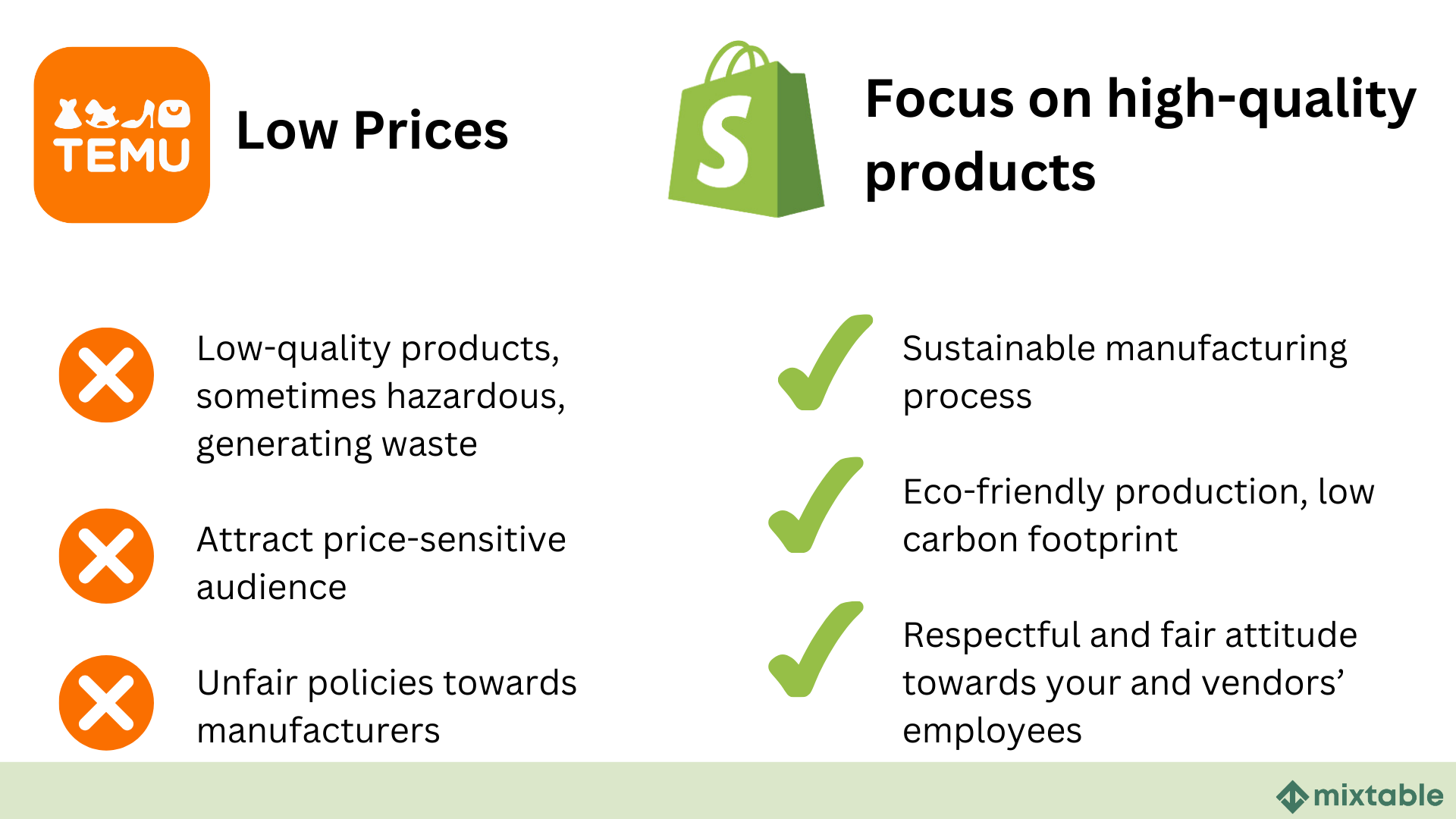
We can’t argue - Temu’s low prices are a huge advantage. But as the British say,
“I’m not rich enough to buy cheap”
And we all know that cheap products can’t be high quality.
There will always be people who will go for the low prices. Fortunately, there are also people who value their time, the quality of the products they use is important, and they are also conscientious about the environment and the people on the supply chain.
What can Shopify Merchants do about Temu’s low prices?
- Use Shopify metafields to add important information about product quality (that can also help with SEO)
- Add details about their production standards
- Add Eco-friendly and Low-carbon footprint tags
How to do that in Shopify?
- You can manually add metafields via the Shopify admin
- If you have 50+ products, adding metafields in bulk with the Mixtable Spreadsheet app would be easier.
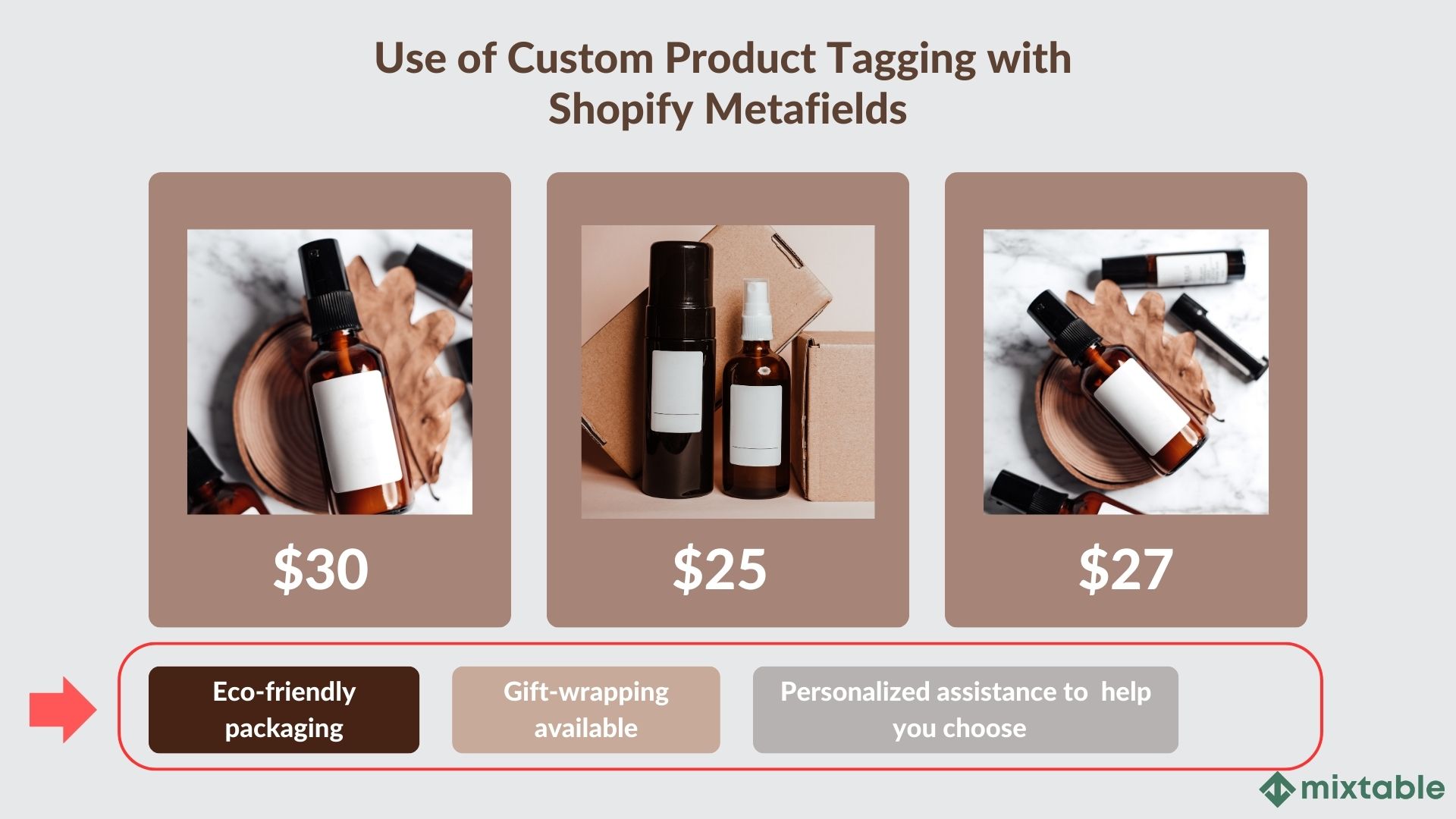
#2: Temu’s aggressive marketing
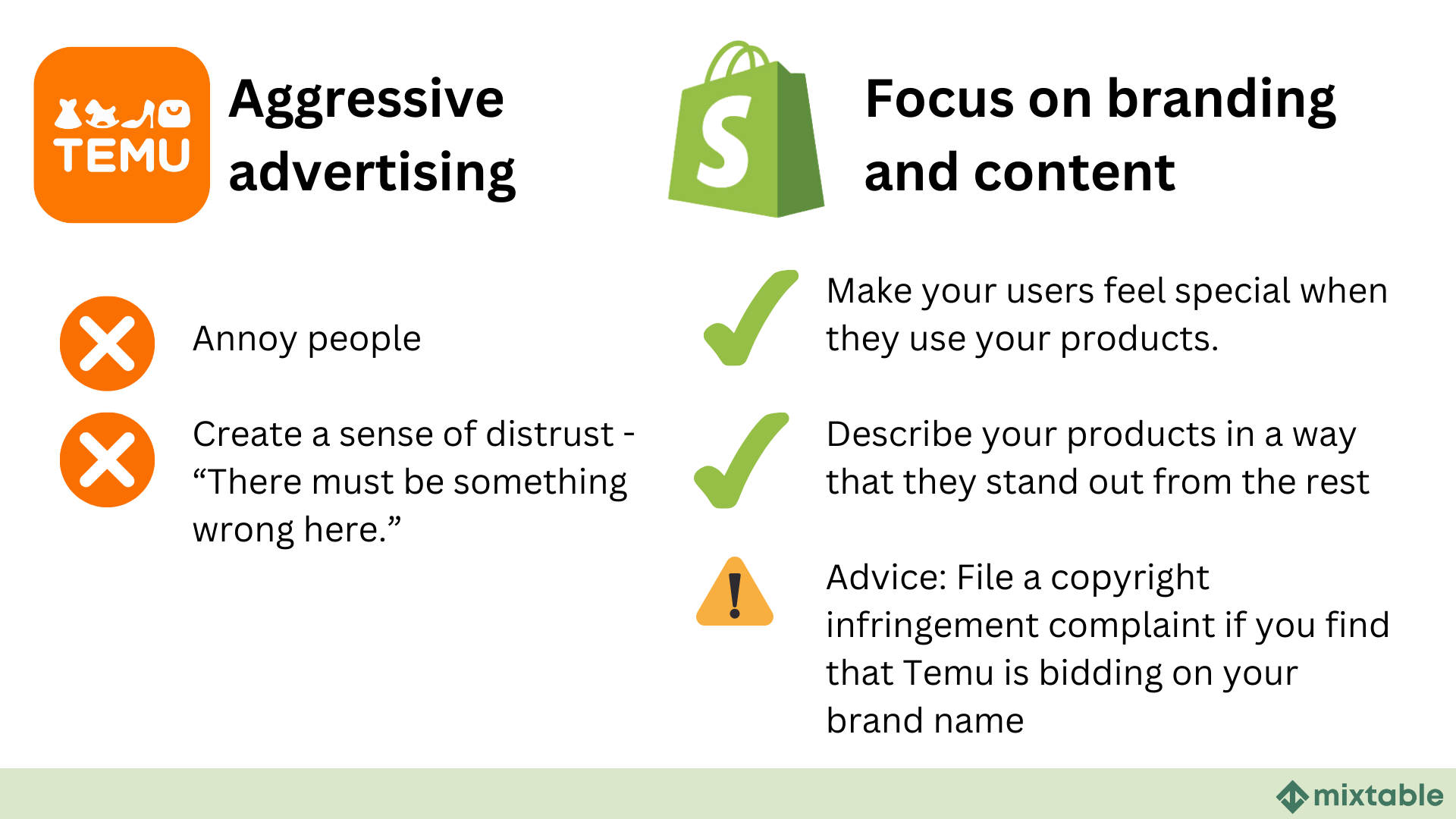
I’ve ordered from Temu three times already, and though I deleted the app immediately after the orders (or perhaps because of it), I get bombarded with their ads everywhere I go. I see at least 10 ads from Temu every single day! And their ads are not bad—the images and videos are catchy, and the targeting is done extremely well (they have both the data and AI, after all).
So, now that we know their marketing budget is HUGE and that spending like this on ads simply cannot last long, we’d better do something about it in the meantime.
What can Shopify Merchants do about Temu’s aggressive advertising?
- Focus on brand building. Successful Shopify merchants are very good at branding. You sell boutique goods and work hard to prove to users why your products are special and valuable.
- From sports goods to travel bags to designer clothes and jewelry to art - to be a profitable online merchant, you should invest time and effort in building a unique brand perception so that your customers perceive you as not just any store but the very store that will serve their needs.
- Creating great content, including product images, videos, emails, and articles, plays a huge role in building and maintaining that perception.
This brand investment will be the long-lasting differentiator between being just somebody selling goods and being at the mercy of the latest price discount from Temu, Shein, Ali Baba, or eBay, or selling products that customers proudly show to their friends.
How do you do that in Shopify?
- Should you decide to update visuals on your store, you can easily bulk-change them with the Mixtable spreadsheet
- If you want to introduce changes to product descriptions or blog articles, you can do that from the comfort of a spreadsheet.
Important: Protect Your Brand from Copyright Infringement
Temu’s aggressive marketing reportedly led it to scrape all kinds of brand terms and use them in ad copies. If you notice that Temu uses your brand name in their ads, claiming they sell your brand products, you can report them to advertising platforms like Google Ads and Facebook Ads. Follow the links below to file a complaint:
#3: Temu’s gamified shopping experience

Temu is famous for using gamification and other engagement mechanics, such as group shopping, price hunting, etc. That is no surprise, knowing that their parent company is well-versed in gaming. I sometimes wonder if Temu is not, in reality, a gaming app and its low prices are, in fact, the cost of acquiring new users.
The most important benefit of gamifying a platform is that you keep users on it longer, which leads to showing them more products and collecting more data about them. And here’s what Temu is doing - keeping users on average TWICE as much as other platforms, including Amazon:
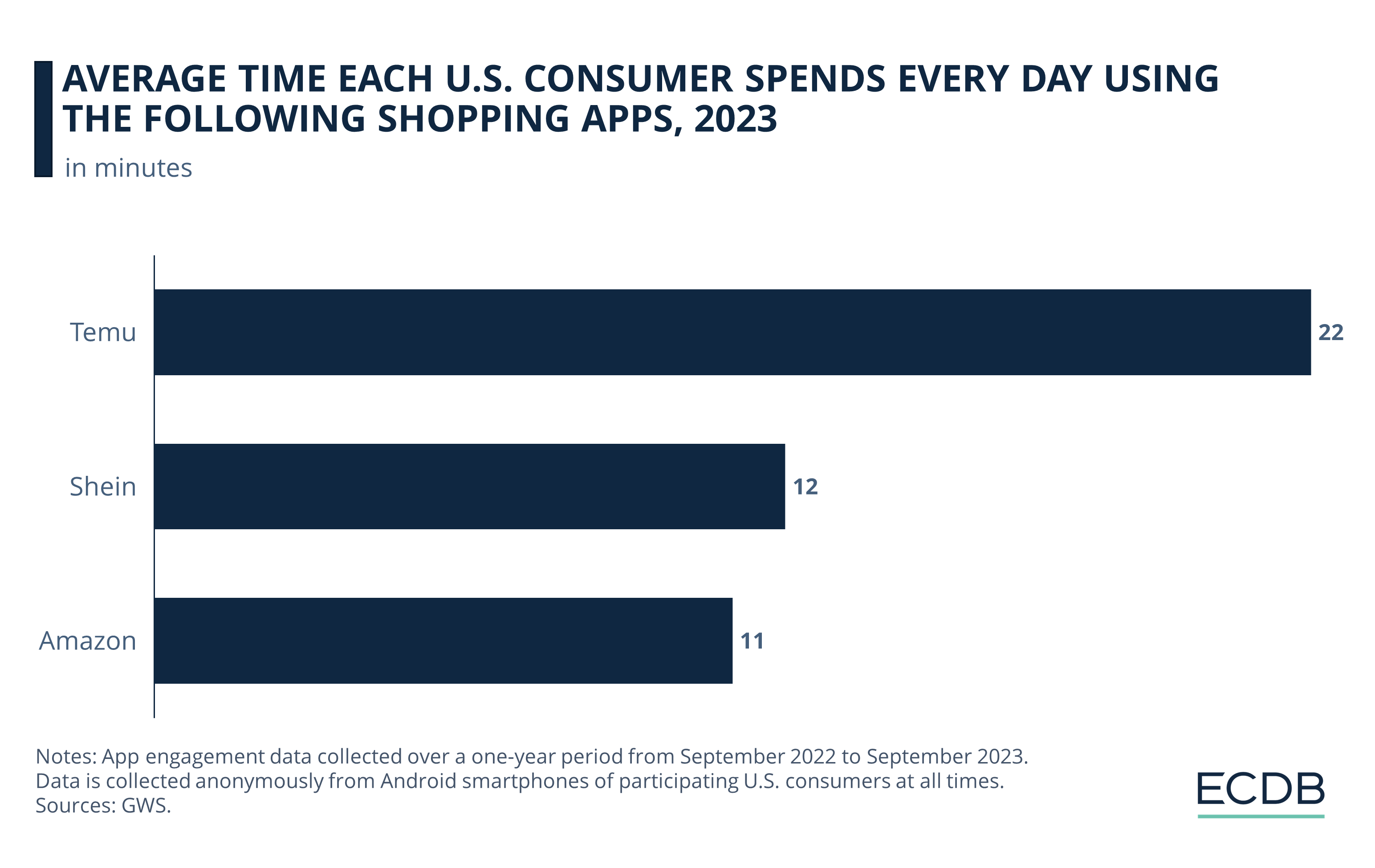
Image source: https://ecommercedb.com/insights/chart/11985
What can Shopify Merchants do about Temu’s gamification?
-
Appeal to users who value their time and show how mindful you are of that. E.g.
- Make sure you don’t ask them twice for the same data once they’ve added it to your store
- Offer gift-wrapping (even make it eco-friendly) and send to a different address
-
Provide personal shopping assistance and chat with experts to save time on research.
How do you do that in Shopify?
- Improve the checkout process to load stored user data (saves time for loyal repeat customers)
- Make sure your in-store search is fast and user-friendly. Add specific filtering options based on the product category and tag your products accordingly
- Add metafields to show the benefits you provide prominently
- Prepare personalized email campaigns to save time for your users - you can do that by activating customer analytics data collection and analyzing your users.
- Add gamification to your store with Shopify apps.
#4: Temu’s Consumer-to-Manufacturer Model
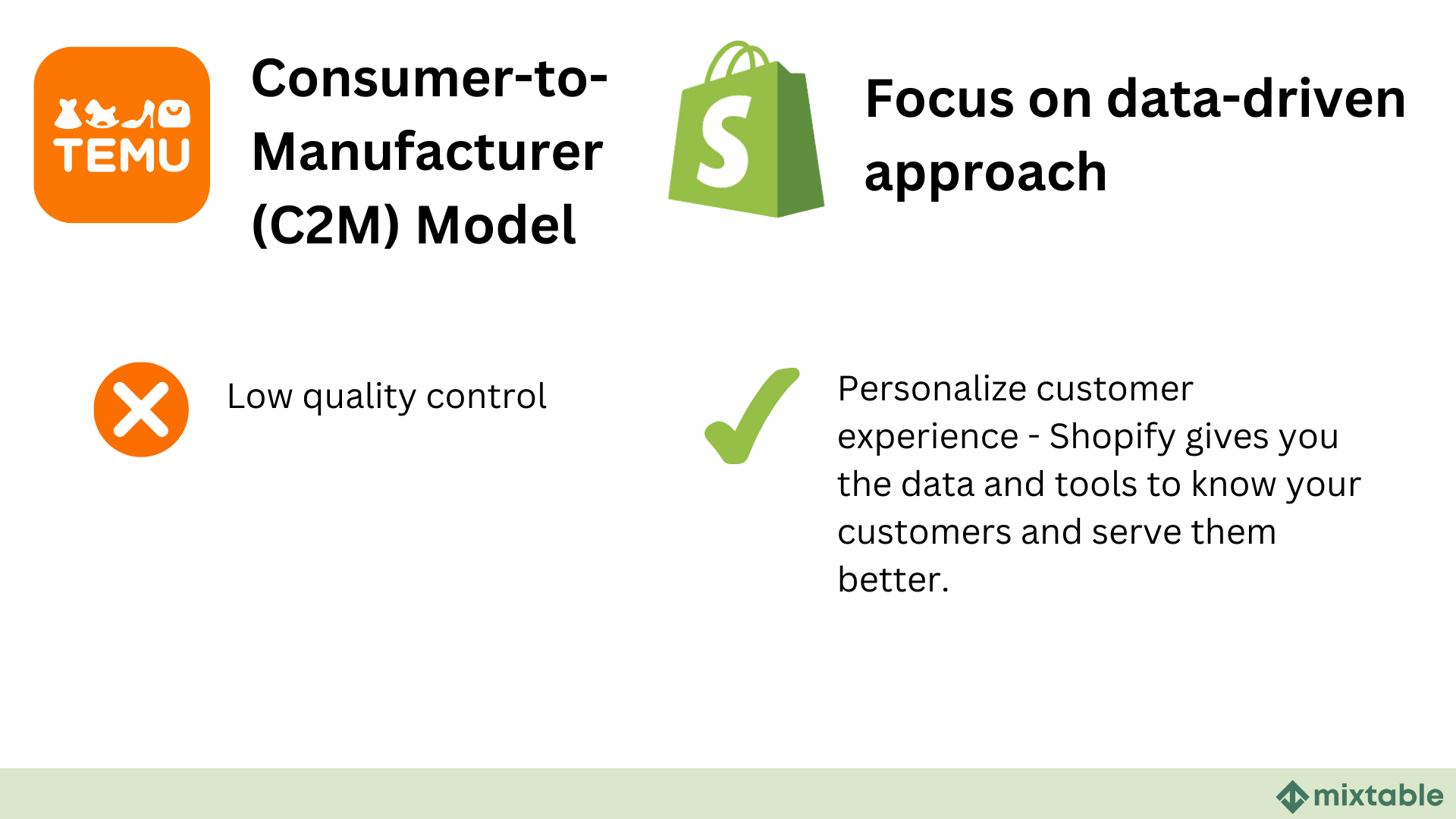
The Consumer-to-Manufacturer (C2M) model, also known as reversed manufacturing, is probably the biggest innovation that Temu introduced for a wide range of products (Shein first launched this model for apparel). In short, the C2M model consists of procuring small amounts of pilot products, testing how well they perform, and, based on results, winning products are stocked en masse, while losing ones are removed from the index. The model helps with introducing higher amounts of new products
What can Shopify Merchants do about Temu’s C2M model?
Again, you can focus on your biggest asset - your customers. Knowing them better will inform you about the needs they satisfy with your products, how to improve your products, and how to market them.
How do you do that in Shopify?
- Run surveys
- Help users choose the right products by adding filtering options and tags (you can add tags en mass with Mixtable)
In conclusion, we can say that Temu is doing something right and has introduced innovations we can learn from, such as gamification and the C2M model. However, they sell questionable quality and utility products and position themselves as a shopping entertainment platform.
If you, as an e-commerce store owner, focus on the quality of the products you sell, the customer service, the care for the environment, and the story behind your brand, you have enough assets not to worry about Temu and the like.



